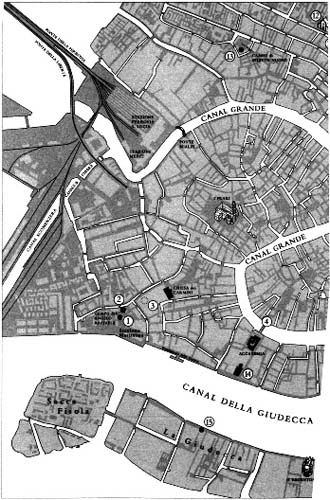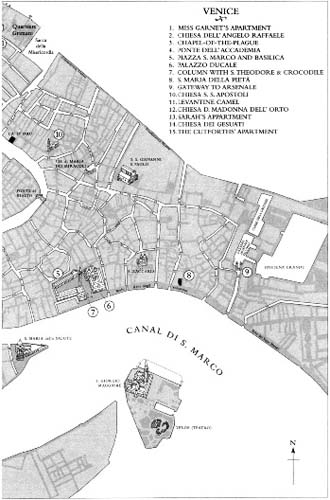
Полная версия
Miss Garnet’s Angel

Miss Garnet’s Angel
Salley Vickers

COPYRIGHT
This novel is entirely a work of fiction. The names, characters and incidents portrayed in it are the work of the author’s imagination. Any resemblance to actual persons, living or dead, events or localities is entirely coincidental.
Fourth Estate
A division of HarperCollinsPublishers Ltd. 1 London Bridge Street London SE1 9GF
www.harpercollins.co.uk
First published in Great Britain by HarperCollinsPublishers 2000
Copyright © Salley Vickers 2000
www.salleyvickers.com
Salley Vickers asserts the moral right to be identified as the author of this work
A catalogue copy of this book is available from the British Library
All rights reserved under International and Pan-American Copyright Conventions. By payment of the required fees, you have been granted the non-exclusive, non-transferable right to access and read the text of this ebook on-screen. No part of this text may be reproduced, transmitted, down-loaded, decompiled, reverse engineered, or stored in or introduced into any information storage and retrieval system, in any form or by any means, whether electronic or mechanical, now known or hereinafter invented, without the express written permission of HarperCollins ebooks
HarperCollinsPublishers has made every reasonable effort to ensure that any picture content or written content in this ebook has been included or removed in accordance with the contractual and technological constraints in operation at the time of publication
Source ISBN: 9780006514213
Ebook Edition © FEBRUARY 2010 ISBN: 9780007364336
Version: 2016-09-19
DEDICATION
For Grace Fredericks, with love and gratitude
EPIGRAPH
‘If some people really see angels, where others see empty space, let them paint the angels…’
JOHN RUSKIN
TABLE OF CONTENTS
Cover Page
Title Page
Copyright
Dedication
Epigraph
Maps
An Introduction To Miss Garnet’s Angel
I Epiphany
1
2
3
4
II Passover
1
2
3
4
5
6
III Visitation
1
2
3
4
5
6
IV The Feast Of Raphael
1
2
3
4
5
Author’s Note
Mr Golightly’s Holiday
1
2
3
4
5
6
Keep Reading
Acknowledgement
Praise
About the Publisher
MAPS


AN INTRODUCTION TO MISS GARNET’S ANGEL
An introduction to one’s own book is an odd thing to write because, inevitably, it must be written after finishing the book–in this case some time after. So, in a sense, although this appears at the start of this book it is not an ‘introduction’ at all, more of an afterword. But if you are anything like me you won’t be reading this till you have finished the book, anyway–if at all!
‘Miss Garnet’s Angel’ has been out in the world for some time now and has its own life, which often feels to have precious little to do with me, its author. I’m not even sure if an author is the best authority on her own work–many people write to me with questions, but also people write and tell me (in effect) that I am wrong about certain things they have heard me say, or read I have said about the book.
I must admit this last tendency, the correcting me on my own work, amuses me. But it also delights me because it proves something I have always believed: that a book is a meeting place between author and reader and that the reader brings almost as much creative power to bear on the book as the person who has written it. Certainly, we authors need readers, not merely to buy and read our books, essential as that is–after all, if you don’t buy our books we can’t get to write and publish more, so you, the readers, have in fact a great power in your hands and can influence what is or isn’t published which, in turn, affects public taste. But authors also need readers to understand what they write, and in the act of being, variously, comprehended a book can grow–even grow wings, which this one certainly has.
I’ve been charmed by the widespread communications I’ve received from round the world: from a Parsi librarian in Bombay, from a monastery in the Australian outback, from a hut in Hawaii, a remote island in Greece, an office in Argentina, a croft in Scotland, a boat on the Adriatic Sea. People sometimes apologise for ‘bothering’ me when they write but goodness knows why–for nothing is more interesting and valuable to a writer than hearing how a book has gone down. Hearing from, and talking with, my readers has expanded my own thinking and understanding.
And along the way, another prejudice of mine has been confirmed, which is that readers’ intelligence is often woefully underrated. Aspects of the book which literary critics–positive as they have been–and even my vigilant editor missed have been picked up by sharp-witted readers. For example, the novel is composed of two stories which parallel and reflect each other but, I hoped, not so obviously as to be intrusive and distract from the simple enjoyment of an unfolding story of one woman’s life. In the old tale of Tobias and the Angel, the Archangel Raphael appears in disguise–this occurs in the contemporary story, but more obliquely, unannounced or commented upon, and readers, I’m happy to say, often spot this hidden theme. The ancients believed that ‘higher’, or ‘lower’, beings revealed themselves to humankind in human form–they didn’t necessarily expect visions or visitations; but the acts of exceptional kindness, or mercy, or forgiveness, as well as their opposites, which humans beings are capable of are perhaps the contemporary equivalent of the old belief in intervening supernatural powers, both malign and benign.
Readers also pose thoughtful questions. Two common questions are asked, which I am not going to answer here, not because it might spoil the book but because there genuinely are no answers. I believe that a book, like a human being, should never quite have everything about it explained but retain some of its mystery. The questions are: What happened to the other part of the diptych? and what happens to Miss Garnet at the novel’s close? The ending, in particular, causes debate–but I think ambiguity is probably one of the elements in the book which makes it distinctive. It’s not that you can choose your ending exactly, but that how you respond to the whole book, and the unravelling of the events of its heroine’s life, will colour how you perceive the end.
People sometimes suggest that the book has had an impact on their own lives–leading them to cast off caution, break out, try new things, and be brave. I don’t think this kind of effect is, or should be, the purpose of a book but I can’t pretend that it doesn’t please me that a book about an elderly tight-lipped atheist spinster virgin, who falls unsuitably in love, gets clobbered for it and only then begins to live fully, should have this seemingly strengthening impact. If it does have some such influence, then I don’t want to take credit for it–my guess is that this kind of development is already nascent in the reader, who may even have alighted on this very book because of some unconscious pre-formed identification with its heroine’s predicament–or with the old story of the hard journey which we must travel if we would overcome the fear and find the love hidden in our own hearts.
How readers choose books is also a mystery, one which the word-of-mouth success of ‘Miss Garnet’s Angel’ suggests defies all prudent modern accounting or clever marketing. Now that’s something we all of us–reader and author–alike might fairly be proud of. For much as I reject the idea of any “philosophy” behind a book, if this book were to reflect any one definable philosophy it might be this: that life is not ours to predict or control, that it resists all such attempts but that, ultimately, individuals know what is good for them–which is not necessarily what others (or even they themselves) might believe is what they want or need–and are, immeasurably–gloriously, even–the stronger and the richer thereby.
Salley Vickers
2003
1
Death is outside life but it alters it: it leaves a hole in the fabric of things which those who are left behind try to repair. Perhaps it is because of this we are minded to feast at funerals and it is said that certain children are conceived on the eve of a departure, lest the separation of the partners be permanent. When in ancient stories heroes die, the first thing their comrades do, having made due observances to the gods, is sit and eat. Then they travel on, challenging, with their frail vitality, the large enigma of non-being.
When Miss Garnet’s friend Harriet died, Miss Garnet decided to spend six months abroad. For Miss Garnet, who was certainly past child-bearing years and had lost the only person she ever ate with, the decision to travel was a bold one. Her expeditions abroad had been few and for the most part tinged with apprehension. As a young woman straight from college she had volunteered, while teaching the Hundred Years’ War, to take a school party to Crécy. On that occasion she had become flustered when, behind her back but audibly, the boys had mocked her accent and had intimated (none too subtly) that she had brought them to France in order to forge a liaison with the large, sweating, white-faced coach driver.
‘Mademoiselle from Armentières,’ they had sung hilariously in the back of the coach. ‘Mademoiselle from Armentières. Hasn’t had sex for forty years!’ And as she had attempted to convey to the coach driver the time she considered it prudent to start back for Calais, wildly and suggestively they had chorused, ‘Inky pinky parley vous!’
The experience had left its mark on Miss Garnet’s teaching as well as on her memory. Essentially a shy person, her impulses towards cordiality with her pupils, never strong in the first place, were dealt a blow. She withdrew, acquired a reputation for strictness, even severity, and in time became the kind of teacher who, if not loved, was at least respected. Even latterly, when in terms of pupils’ taunts Mademoiselle From Armentières would be considered very small beer, no member of Miss Garnet’s classes ever thought publicly to express a view about her intimate life.
Julia Garnet and Harriet Josephs had lived together for more than thirty years. Harriet had answered Julia’s advertisement in the National Union of Teachers’ monthly journal. ‘Quiet, professional female sought to share small West London flat. No smokers. No pets.’
Harriet had been, in fact, the only person to respond to the advertisement, which had not prevented Julia from giving her what her friend later described as ‘a toughish interview’. ‘Honestly,’ Harriet had used to say, on the few occasions when together they had entertained friends, ‘it was worse than the time I tried to get into the Civil Service!’
Generally Harriet had laughed loudly at this point in a way her flat-mate had found irritating. Now Miss Garnet found she missed the laugh just as she missed Stella, Harriet’s cat. The prohibition against pets had been relaxed seven years earlier when late one night after choir-practice Harriet had been followed from the station by Stella. Stella, then an anonymous black kitten with a white-starred throat, had waited all night on the stairs outside the front door of their fourth-floor flat, whereupon, on finding her, the soft-hearted Harriet had fed the kitten milk. After that, as Julia had observed, there was ‘no getting rid of the animal’.
Alongside the two school teachers Stella had grown into an elderly and affectionate creature but it was Harriet to whom the cat had remained attached. Two days after they had both retired (they had arranged the events to coincide in order, Harriet had suggested, that the New Year could see them setting off on ‘new feet’) Julia returned from the shops to find her companion, apparently asleep, stretched out upon the sofa, her romantic novel face down on the carpet. Later, after the doctor and then the undertaker had been, Stella disappeared. Julia had placed milk outside first the flat door and then, worry making her brave the neighbours’ ridicule, downstairs by the main entrance to the block. The milk she left outside was certainly drunk but after a few days she was forced to accept that it was not Stella drinking the milk but, more likely, the urban fox who had been seen rootling in the communal dustbins.
Perhaps it was not just the loss of Stella, but also her incompetence in the face of it–so soon after losing Harriet–which finally determined Miss Garnet’s abrupt decision. She and Harriet had made plans–or rather Harriet had–for it must be said that, of the two, she was the more given to planning. (‘Flighty’ was sometimes her companion’s name for Harriet’s tendency to cut out advertisements from the Observer for trips to faraway and exotic places.) Harriet’s (now permanent) flight had rendered the plans pointless; a kind of numbness had dulled Miss Garnet’s usual caution and she found herself, before she was quite aware what was happening, calling in on one of the numerous local estate agents which had sprung up in her locality.
‘No worries, Mrs Garnet, we’ll be able to rent this, easy,’ the young man with the too-short haircut and the fluorescent mobile phone had said.
‘Miss Garnet, it’s Miss,’ she had explained, anxious not to accept a title to which she felt she had never managed to rise. (There had never been any question of Miss Garnet being a Ms: her great-aunt had had some association with Christabel Pankhurst and the connection, however loose, with the famous suffragette had strengthened Miss Garnet’s views on the misplaced priorities of modern feminism.)
‘Miss, I’m sorry,’ the young man had said, trying not to laugh at the poor old bird. He’d heard from Mrs Barry, the caretaker, that there had been another old girl living with her who had just died. Probably lezzies, he thought.
Miss Garnet was not a lesbian, any more than Harriet Josephs had been, although both women had grown aware that that is what people sometimes assumed of them.
‘It is very vexing,’ Harriet had said once, when a widowed friend had opined that Jane Austen might have been gay, ‘to be considered homosexual just because one hasn’t been lucky enough to marry.’
‘Or foolish enough,’ Julia had added. But privately she believed Harriet was right. It would have been a piece of luck to have been loved by a man enough to have been his wife. She had been asked once for a kiss, at the end-of-term party at the school where she had taught History for thirty-five years. The request had come from a man who, late in life, had felt it was his vocation to teach and had come, for his probationary year, to St Barnabas and St James, where Miss Garnet had risen to the position of Head of the History Department. But he had been asked to leave after he had been observed hanging around the fifth-form girls’ lockers after Games. Julia, who had regretted not obliging with the kiss, wept secretly into her handkerchief on hearing of Mr Kenton’s departure. Later she plucked up courage to write to him, with news about the radical modern play he had been directing. Mr Maguire, Head of English, had had to take over–and in Miss Garnet’s view the play had suffered as a consequence. Timidly, she had communicated this thought to the departed Mr Kenton but the letter had been returned with ‘NOT KNOWN AT THIS ADDRESS’ printed on the outside. Miss Garnet had found herself rather relieved and had silently shredded her single attempt at seduction into the rubbish bin.
‘Where you off to then?’ the young estate agent had asked, after they had agreed the terms on which the flat was to be let (no smoking, and no pets–out of respect to Stella).
Perhaps it was the young man’s obvious indifference which acted as a catalyst to the surprising form she found her answer taking–for she had not, in fact, yet formulated in her mind where she might go, should the flat prove acceptable for letting to Messrs Brown & Noble.
Across Miss Garnet’s memory paraded the several coloured advertisements for far-flung places which, along with some magazine cuttings concerning unsuitable hair dye, she had cleared from Harriet’s oak bureau and which (steeling herself a little) she had recently placed in the dustbin. One advertisement had been for a cruise around the Adriatic Sea, visiting cities of historical interest. The most famous of these now flashed savingly into her mind.
‘Venice,’ she announced firmly. ‘I shall be taking six months in Venice.’ And then, because it is rarely possible, at a stroke, to throw off the habits of a lifetime, ‘I believe it is cheaper at this time of year.’
It was cold when Miss Garnet landed at Marco Polo airport. Uncertain of all that she was likely to encounter on her exotic adventure she had at least had the foresight to equip herself with good boots. The well-soled boots provided a small counter to her sense of being somewhat insubstantial when, having collected her single suitcase with the stout leather strap which had been her mother’s, she followed the other arrivals outside to where a man with a clipboard shouted and gestured.
Before her spread a pearl-grey, shimmering, quite alien waste of water.
‘Zattere,’ Miss Garnet enunciated. She had, through an agency found in the Guardian’s Holiday Section, taken an appartamento in one of the cheaper areas of Venice. And then, more distinctly, because the man with the clipboard appeared to pay no attention, ‘Zattere!’
‘Si, si, Signora, momento, momento.’ He gestured at a water-taxi and then at a well-dressed couple who had pushed ahead of Miss Garnet in the shambling queue. ‘Prego?’
‘Hotel Gritti Palace?’ The man, a tall American with a spade-cut beard, spoke with the authority of money. Even Miss Garnet knew that the Gritti was one of the more exclusive of Venice’s many expensive hotels. She had been disappointed to learn that a Socialist playwright, one whom she admired, was in the habit of taking rooms there each spring. Years ago, as a student teacher, Miss Garnet had, rather diffidently, joined the Labour Party. Over the years she had found the policies of succeeding leaders inadequately representative of her idea of socialism. Readings of first Marx and then Lenin had led her, less diffidently, to leave the Labour Party to join the Communists instead. Despite all that had happened in Europe over the years she saw no reason now to alter her allegiance to the ideology which had sustained her for so long. Indeed, it was partly Venice’s reputation for left-wing activity which had underpinned her novel notion to reside there for six months. Now the long plane flight, the extreme cold rising off the grey-green lagoon waters and the extremer fear, rising from what seemed more and more like her own foolhardiness, joined force with political prejudice.
‘Excuse me,’ Miss Garnet raised her voice towards the polished couple, ‘but I was first.’ As she spoke she lost her footing, grazing her leg against a bollard.
The woman of the couple turned to examine the person from whom these commanding words had issued. She saw a thin woman of medium height wearing a long tweed coat and a hat with a veil caught back against the crown. The hat had belonged to Harriet and although Miss Garnet, when she had seen it on Harriet, had considered it overdramatic, she had found herself reluctant to relegate it to the Oxfam box. The hat represented, she recognised, a side to Harriet which she had disregarded when her friend was alive. As a kind of impulsive late gesture to her friend’s sense of the theatrical, she had placed the hat onto her head in the last minutes before leaving for the airport.
Perhaps it was the hat or perhaps it was the tone of voice but the couple responded as if Miss Garnet was a ‘somebody’. Maybe, they thought, she is one of the English aristocracy who consider it bad form to dress showily. Certainly the little woman with the delicately angular features spoke with the diction of a duchess.
‘Excuse us,’ the man spoke in a deep New England accent, ‘we would be honoured if you would share our taxi.’
Miss Garnet paused. She was unaccustomed to accepting favours, especially from tall, urbane-mannered men. But she was tired and, she had to own, rather scared. Her knee hurt where she had stupidly bashed it. And there remained the fact that they had, after all, pushed in front of her.
‘Thank you,’ she spoke more loudly than usual so as to distract attention from the blood she feared was now seeping observably through her thick stocking, ‘I should be glad to share with you.’
The American couple, concerned to undo any unintentional impoliteness, insisted the water-taxi take Miss Garnet to the Campo Angelo Raffaele, where the apartment she had rented was located. Miss Garnet had chosen the address, out of many similar possibilities, on account of the name. Devout Communist as she was, there was something reassuring about the Angel Raphael. She found the numerous other saintly figures, whose names attach to Venice’s streets and monuments, unfamiliar and off-putting. The Angel Raphael she knew about. Of the Archangels of her Baptist childhood, Gabriel, Michael, Raphael, the latter had the most appeal.
The water-taxi drew up at shallow broad stone steps, covered in a dangerous-looking green slime. Miss Garnet, holding back the long skirts of her coat, carefully stepped out of the boat.
‘Oh, but you have hurt yourself!’ cried the American woman, whose name, Miss Garnet had learned, was Cynthia.
But Miss Garnet, who was looking up, had caught the benevolent gaze of an angel. He was standing with a protective arm around what appeared to be a small boy carrying a large fish. On the other side of the angel was a hound.
‘Thank you,’ she said, slightly dazed, ‘I shall be fine.’ Then, ‘Oh, but I must pay you,’ she shouted as the boat moved off down the rio. But the Americans only waved smiling and shouted back that it could wait and she could pay what she owed when they all met again. ‘Look after that leg, now,’ urged the woman, and, ‘Come to our hotel,’ boomed the man, so loudly that three small boys on the other side of the canal called out and waved too at the departing boat.
Miss Garnet found that the departure of the newly met Americans left her feeling forlorn. Impatient with what seemed a silly show of sentimentality in herself, she caught up her suitcase and her hand luggage and looked about to get her bearings. Above her the angel winked down again and she now took in that this was the frontage of the Chiesa dell’Angelo Raffaele itself, which lent its name not only to the campo but also, most graciously, to the waterfront before it.






